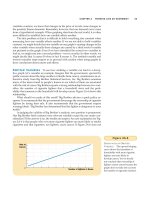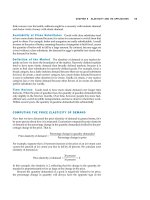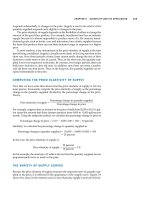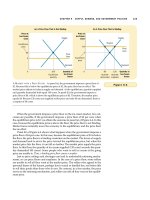Tài liệu OECD Principles of Corporate Governance pptx
Bạn đang xem bản rút gọn của tài liệu. Xem và tải ngay bản đầy đủ của tài liệu tại đây (471.44 KB, 69 trang )
ISBN 92-64-01597-3
26 2004 02 1 P
OECD Principles
of Corporate
Governance
OECD Principles of Corporate Governance
Since they were issued in 1999, the OECD Principles of Corporate Governance
have gained worldwide recognition as an international benchmark for good
corporate governance. They are actively used by governments, regulators,
investors, corporations and stakeholders in both OECD and non-OECD countries
and have been adopted by the Financial Stability Forum as one of the Twelve Key
Standards for Sound Financial Systems. The Principles are intended to assist in
the evaluation and improvement of the legal, institutional and regulatory
framework that influences corporate governance. They also provide guidance for
stock exchanges, investors, corporations, and others that have a role in the
process of developing good corporate governance.
The Principles should be viewed as a living document. This revised version
takes into account developments since 1999 and includes several important
amendments. The revision has benefited greatly from extensive public
consultations. This revised version of the OECD Principles was agreed by the
OECD member countries on 22 April 2004.
For any comments, questions or suggestions concerning the OECD Principles of
Corporate Governance, please contact the Corporate Affairs Division of the OECD
at: For more information about the OECD’s work in
the area of corporate governance and the OECD Principles, visit:
www.oecd.org/daf/corporate/principles.
-:HSTCQE=UVZ^\Z:
2004
«
2004
www.oecd.org
OECD's books, periodicals and statistical databases are now available via www.SourceOECD.org,
our online library.
This book is available to subscribers to the following SourceOECD themes:
Industry, Services and Trade
Governance
Ask your librarian for more details of how to access OECD books online, or write to us at
© OECD, 2004.
© Software: 1987-1996, Acrobat is a trademark of ADOBE.
All rights reserved. OECD grants you the right to use one copy of this Program for your personal use only.
Unauthorised reproduction, lending, hiring, transmission or distribution of any data or software is
prohibited. You must treat the Program and associated materials and any elements thereof like any other
copyrighted material.
All requests should be made to:
Head of Publications Service,
OECD Publications Service,
2, rue André-Pascal,
75775 Paris Cedex 16, France.
OECD Principles
of Corporate Governance
2004
ORGANISATION FOR ECONOMIC CO-OPERATION AND DEVELOPMENT
Cover-e.fm Page 1 Thursday, April 29, 2004 11:02 AM
ORGANISATION FOR ECONOMIC CO-OPERATION
AND DEVELOPMENT
Pursuant to Article 1 of the Convention signed in Paris on 14th December 1960,
and which came into force on 30th September 1961, the Organisation for Economic
Co-operation and Development (OECD) shall promote policies designed:
– to achieve the highest sustainable economic growth and employment and a
rising standard of living in member countries, while maintaining financial
stability, and thus to contribute to the development of the world economy;
– to contribute to sound economic expansion in member as well as non-member
countries in the process of economic development; and
– to contribute to the expansion of world trade on a multilateral, non-discriminatory
basis in accordance with international obligations.
The original member countries of the OECD are Austria, Belgium, Canada, Denmark,
France, Germany, Greece, Iceland, Ireland, Italy, Luxembourg, the Netherlands, Norway,
Portugal, Spain, Sweden, Switzerland, Turkey, the United Kingdom and the United States.
The following countries became members subsequently through accession at the dates
indicated hereafter: Japan (28th April 1964), Finland (28th January 1969), Australia
(7th June 1971), New Zealand (29th May 1973), Mexico (18th May 1994), the Czech Republic
(21st December 1995), Hungary (7th May 1996), Poland (22nd November 1996), Korea
(12th December 1996) and the Slovak Republic (14th December 2000). The Commission
of the European Communities takes part in the work of the OECD (Article 13 of the
OECD Convention).
Publié en français sous le titre :
Principes de gouvernement d’entreprise de l’OCDE
2004
© OECD 2004
Permission to reproduce a portion of this work for non-commercial purposes or classroom use should be obtained through the
Centre français d’exploitation du droit de copie (CFC), 20, rue des Grands-Augustins, 75006 Paris, France, tel. (33-1) 44 07 47 70,
fax (33-1) 46 34 67 19, for every country except the United States. In the United States permission should be obtained
through the Copyright Clearance Center, Customer Service, (508)750-8400, 222 Rosewood Drive, Danvers, MA 01923 USA,
or CCC Online: www.copyright.com. All other applications for permission to reproduce or translate all or part of this book
should be made to OECD Publications, 2, rue André-Pascal, 75775 Paris Cedex 16, France.
Cover-e.fm Page 2 Thursday, April 29, 2004 11:02 AM
3
© OECD 2004
Foreword
The OECD Principles of Corporate Governance were endorsed by
OECD Ministers in 1999 and have since become an international benchmark
for policy makers, investors, corporations and other stakeholders worldwide.
They have advanced the corporate governance agenda and provided specific
guidance for legislative and regulatory initiatives in both OECD and non
OECD countries. The Financial Stability Forum has designated the
Principles as one of the 12 key standards for sound financial systems. The
Principles also provide the basis for an extensive programme of co-
operation between OECD and non-OECD countries and underpin the
corporate governance component of World Bank/IMF Reports on the
Observance of Standards and Codes (ROSC).
The Principles have now been thoroughly reviewed to take account of
recent developments and experiences in OECD member and non-member
countries. Policy makers are now more aware of the contribution good
corporate governance makes to financial market stability, investment and
economic growth. Companies better understand how good corporate
governance contributes to their competitiveness. Investors – especially
collective investment institutions and pension funds acting in a fiduciary
capacity – realise they have a role to play in ensuring good corporate
governance practices, thereby underpinning the value of their investments.
In today’s economies, interest in corporate governance goes beyond that of
shareholders in the performance of individual companies. As companies
play a pivotal role in our economies and we rely increasingly on private
sector institutions to manage personal savings and secure retirement
incomes, good corporate governance is important to broad and growing
segments of the population.
The review of the Principles was undertaken by the OECD Steering
Group on Corporate Governance under a mandate from OECD Ministers
in 2002. The review was supported by a comprehensive survey of how
member countries addressed the different corporate governance challenges
they faced. It also drew on experiences in economies outside the OECD area
where the OECD, in co-operation with the World Bank and other sponsors,
4 – OECD PRINCIPLES OF CORPORATE GOVERNANCE
© OECD 2004
organises Regional Corporate Governance Roundtables to support regional
reform efforts.
The review process benefited from contributions from many parties.
Key international institutions participated and extensive consultations were
held with the private sector, labour, civil society and representatives from
non-OECD countries. The process also benefited greatly from the insights of
internationally recognised experts who participated in two high level
informal gatherings I convened. Finally, many constructive suggestions
were received when a draft of the Principles was made available for public
comment on the internet.
The Principles are a living instrument offering non-binding standards
and good practices as well as guidance on implementation, which can be
adapted to the specific circumstances of individual countries and regions.
The OECD offers a forum for ongoing dialogue and exchange of
experiences among member and non-member countries. To stay abreast of
constantly changing circumstances, the OECD will closely follow
developments in corporate governance, identifying trends and seeking
remedies to new challenges.
These Revised Principles will further reinforce OECD’s contribution
and commitment to collective efforts to strengthen the fabric of corporate
governance around the world in the years ahead. This work will not
eradicate criminal activity, but such activity will be made more difficult as
rules and regulations are adopted in accordance with the Principles.
Importantly, our efforts will also help develop a culture of values for
professional and ethical behaviour on which well functioning markets
depend. Trust and integrity play an essential role in economic life and for
the sake of business and future prosperity we have to make sure that they are
properly rewarded.
Donald J. Johnston
OECD Secretary-General
OECD PRINCIPLES OF CORPORATE GOVERNANCE – 5
© OECD 2004
ACKNOWLEDGEMENTS
I would like to express my appreciation to members of the Steering Group and
its Chair, Ms. Veronique Ingram, whose dedication and expertise made it
possible to complete the review so effectively in a short period of time. I would
also thank all those officials and experts from around the world who
participated in our consultations, submitted comments or otherwise contributed
to ensuring the continued relevance of the OECD Principles of Corporate
Governance in changing times.
Special thanks are due to Ira Millstein and Sir Adrian Cadbury who have
contributed so much since OECD’s corporate governance work first began and
indeed to all the participants in the two high level gatherings I convened in Paris
and other distinguished experts who contributed to the review, including: Susan
Bies, Susan Bray, Ron Blackwell, Alain-Xavier Briatte, David Brown, Luiz
Cantidiano, Maria Livanos Cattaui, Peter Clifford, Andrew Crockett, Stephen
Davis, Peter Dey, Carmine Di Noia, John Evans, Jeffrey Garten, Leo
Goldschmidt, James Grant, Gerd Häusler, Tom Jones, Stephen Joynt, Erich
Kandler, Michael Klein, Igor Kostikov, Daniel Lebegue, Jean-François Lepetit,
Claudine Malone, Teruo Masaki, Il-Chong Nam, Taiji Okusu, Michel Pebereau,
Caroline Phillips, Patricia Peter, John Plender, Michel Prada, Iain Richards,
Alastair Ross Goobey, Albrecht Schäfer, Christian Schricke, Fernando Teixeira
dos Santos, Christian Strenger, Barbara Thomas, Jean-Claude Trichet, Tom
Vant, Graham Ward, Edwin Williamson, Martin Wassell, Peter Woicke,
David Wright and Eddy Wymeersch.
In addition to participants from all OECD countries, the OECD Steering Group
on Corporate Governance includes regular observers from the World Bank, the
International Monetary Fund (IMF) and the Bank for International Settlements
(BIS). For the purpose of the review of the Principles, the Financial Stability
Forum (FSF), the Basel Committee on Banking Supervision, and the
International Organization of Securities Commissions (IOSCO) were invited as
ad hoc observers.
I am also pleased to acknowledge the constructive contributions of the OECD’s
Business and Industry Advisory Committee (BIAC) and the Trade Union
Advisory Committee (TUAC) whose representatives participated actively
throughout the review process, including the regular meetings of the Steering
Group.
Finally, I thank the OECD Secretariat staff in the Directorate for Financial and
Enterprise Affairs who devoted long hours to serve the Steering Group with
dedication and excellence: William Witherell, Rainer Geiger, Rinaldo Pecchioli,
Robert Ley, Mats Isaksson, Grant Kirkpatrick, Alessandro Goglio, Laura
Holliday and other members of the Corporate Affairs Division.
7
© OECD 2004
Table of Contents
Preamble 11
Part One
The OECD Principles of Corporate Governance
I. Ensuring the Basis for an Effective Corporate Governance Framework 17
II. The Rights of Shareholders and Key Ownership Functions 18
III. The Equitable Treatment of Shareholders 20
IV. The Role of Stakeholders in Corporate Governance 21
V. Disclosure and Transparency 22
VI. The Responsibilities of the Board 24
Part Two
Annotations to the OECD Principles of Corporate Governance
I. Ensuring the Basis for an Effective Corporate Governance Framework 29
II. The Rights of Shareholders and Key Ownership Functions 32
III. The Equitable Treatment of Shareholders 40
IV. The Role of Stakeholders in Corporate Governance 46
V. Disclosure and Transparency 49
VI. The Responsibilities of the Board 58
9
© OECD 2004
OECD Principles of Corporate Governance
The OECD Principles of Corporate Governance were originally
developed in response to a call by the OECD Council Meeting at Ministerial
level on 27-28 April 1998, to develop, in conjunction with national
governments, other relevant international organisations and the private
sector, a set of corporate governance standards and guidelines. Since the
Principles were agreed in 1999, they have formed the basis for corporate
governance initiatives in both OECD and non-OECD countries alike.
Moreover, they have been adopted as one of the Twelve Key Standards for
Sound Financial Systems by the Financial Stability Forum. Accordingly,
they form the basis of the corporate governance component of the World
Bank/IMF Reports on the Observance of Standards and Codes (ROSC).
The OECD Council Meeting at Ministerial Level in 2002 agreed to
survey developments in OECD countries and to assess the Principles in light
of developments in corporate governance. This task was entrusted to the
OECD Steering Group on Corporate Governance, which comprises
representatives from OECD countries. In addition, the World Bank, the
Bank for International Settlements (BIS) and the International Monetary
Fund (IMF) were observers to the Group. For the assessment, the Steering
Group also invited the Financial Stability Forum, the Basel Committee, and
the International Organization of Securities Commissions (IOSCO) as ad
hoc observers.
In its review of the Principles, the Steering Group has undertaken
comprehensive consultations and has prepared with the assistance of
members the Survey of Developments in OECD Countries. The
consultations have included experts from a large number of countries which
have participated in the Regional Corporate Governance Roundtables that
the OECD organises in Russia, Asia, South East Europe, Latin America and
Eurasia with the support of the Global Corporate Governance Forum and
others, and in co-operation with the World Bank and other non-OECD
countries as well. Moreover, the Steering Group has consulted a wide range
of interested parties such as the business sector, investors, professional
groups at national and international levels, trade unions, civil society
organisations and international standard setting bodies. A draft version of
10 – OECD PRINCIPLES OF CORPORATE GOVERNANCE
© OECD 2004
the Principles was put on the OECD website for public comment and
resulted in a large number of responses. These have been made public on the
OECD web site.
On the basis of the discussions in the Steering Group, the Survey and the
comments received during the wide ranging consultations, it was concluded
that the 1999 Principles should be revised to take into account new
developments and concerns. It was agreed that the revision should be
pursued with a view to maintaining a non-binding principles-based
approach, which recognises the need to adapt implementation to varying
legal economic and cultural circumstances. The revised Principles contained
in this document thus build upon a wide range of experience not only in the
OECD area but also in non-OECD countries.
11
© OECD 2004
Preamble
The Principles are intended to assist OECD and non-OECD
governments in their efforts to evaluate and improve the legal, institutional
and regulatory framework for corporate governance in their countries, and to
provide guidance and suggestions for stock exchanges, investors,
corporations, and other parties that have a role in the process of developing
good corporate governance. The Principles focus on publicly traded
companies, both financial and non-financial. However, to the extent they are
deemed applicable, they might also be a useful tool to improve corporate
governance in non-traded companies, for example, privately held and state-
owned enterprises. The Principles represent a common basis that OECD
member countries consider essential for the development of good
governance practices. They are intended to be concise, understandable and
accessible to the international community. They are not intended to
substitute for government, semi-government or private sector initiatives to
develop more detailed “best practice” in corporate governance.
Increasingly, the OECD and its member governments have recognised
the synergy between macroeconomic and structural policies in achieving
fundamental policy goals. Corporate governance is one key element in
improving economic efficiency and growth as well as enhancing investor
confidence. Corporate governance involves a set of relationships between a
company’s management, its board, its shareholders and other stakeholders.
Corporate governance also provides the structure through which the
objectives of the company are set, and the means of attaining those
objectives and monitoring performance are determined. Good corporate
governance should provide proper incentives for the board and management
to pursue objectives that are in the interests of the company and its
shareholders and should facilitate effective monitoring. The presence of an
effective corporate governance system, within an individual company and
across an economy as a whole, helps to provide a degree of confidence that
is necessary for the proper functioning of a market economy. As a result, the
cost of capital is lower and firms are encouraged to use resources more
efficiently, thereby underpinning growth.
12 – OECD PRINCIPLES OF CORPORATE GOVERNANCE
© OECD 2004
Corporate governance is only part of the larger economic context in
which firms operate that includes, for example, macroeconomic policies and
the degree of competition in product and factor markets. The corporate
governance framework also depends on the legal, regulatory, and
institutional environment. In addition, factors such as business ethics and
corporate awareness of the environmental and societal interests of the
communities in which a company operates can also have an impact on its
reputation and its long-term success.
While a multiplicity of factors affect the governance and decision-
making processes of firms, and are important to their long-term success, the
Principles focus on governance problems that result from the separation of
ownership and control. However, this is not simply an issue of the
relationship between shareholders and management, although that is indeed
the central element. In some jurisdictions, governance issues also arise from
the power of certain controlling shareholders over minority shareholders. In
other countries, employees have important legal rights irrespective of their
ownership rights. The Principles therefore have to be complementary to a
broader approach to the operation of checks and balances. Some of the other
issues relevant to a company’s decision-making processes, such as
environmental, anti-corruption or ethical concerns, are taken into account
but are treated more explicitly in a number of other OECD instruments
(including the Guidelines for Multinational Enterprises and the Convention
on Combating Bribery of Foreign Public Officials in International
Transactions) and the instruments of other international organisations.
Corporate governance is affected by the relationships among
participants in the governance system. Controlling shareholders, which may
be individuals, family holdings, bloc alliances, or other corporations acting
through a holding company or cross shareholdings, can significantly
influence corporate behaviour. As owners of equity, institutional investors
are increasingly demanding a voice in corporate governance in some
markets. Individual shareholders usually do not seek to exercise governance
rights but may be highly concerned about obtaining fair treatment from
controlling shareholders and management. Creditors play an important role
in a number of governance systems and can serve as external monitors over
corporate performance. Employees and other stakeholders play an important
role in contributing to the long-term success and performance of the
corporation, while governments establish the overall institutional and legal
framework for corporate governance. The role of each of these participants
and their interactions vary widely among OECD countries and among non-
OECD countries as well. These relationships are subject, in part, to law and
regulation and, in part, to voluntary adaptation and, most importantly, to
market forces.
OECD PRINCIPLES OF CORPORATE GOVERNANCE – 13
© OECD 2004
The degree to which corporations observe basic principles of good
corporate governance is an increasingly important factor for investment
decisions. Of particular relevance is the relation between corporate
governance practices and the increasingly international character of
investment. International flows of capital enable companies to access
financing from a much larger pool of investors. If countries are to reap the
full benefits of the global capital market, and if they are to attract long-term
“patient” capital, corporate governance arrangements must be credible, well
understood across borders and adhere to internationally accepted principles.
Even if corporations do not rely primarily on foreign sources of capital,
adherence to good corporate governance practices will help improve the
confidence of domestic investors, reduce the cost of capital, underpin the
good functioning of financial markets, and ultimately induce more stable
sources of financing.
There is no single model of good corporate governance. However, work
carried out in both OECD and non-OECD countries and within the
Organisation has identified some common elements that underlie good
corporate governance. The Principles build on these common elements and
are formulated to embrace the different models that exist. For example, they
do not advocate any particular board structure and the term “board” as used
in this document is meant to embrace the different national models of board
structures found in OECD and non-OECD countries. In the typical two tier
system, found in some countries, “board” as used in the Principles refers to
the “supervisory board” while “key executives” refers to the “management
board”. In systems where the unitary board is overseen by an internal
auditor’s body, the principles applicable to the board are also, mutatis
mutandis, applicable. The terms “corporation” and “company” are used
interchangeably in the text.
The Principles are non-binding and do not aim at detailed prescriptions
for national legislation. Rather, they seek to identify objectives and suggest
various means for achieving them. Their purpose is to serve as a reference
point. They can be used by policy makers as they examine and develop the
legal and regulatory frameworks for corporate governance that reflect their
own economic, social, legal and cultural circumstances, and by market
participants as they develop their own practices.
The Principles are evolutionary in nature and should be reviewed in
light of significant changes in circumstances. To remain competitive in a
changing world, corporations must innovate and adapt their corporate
governance practices so that they can meet new demands and grasp new
opportunities. Similarly, governments have an important responsibility for
shaping an effective regulatory framework that provides for sufficient
flexibility to allow markets to function effectively and to respond to
14 – OECD PRINCIPLES OF CORPORATE GOVERNANCE
© OECD 2004
expectations of shareholders and other stakeholders. It is up to governments
and market participants to decide how to apply these Principles in
developing their own frameworks for corporate governance, taking into
account the costs and benefits of regulation.
The following document is divided into two parts. The Principles
presented in the first part of the document cover the following areas: I)
Ensuring the basis for an effective corporate governance framework; II) The
rights of shareholders and key ownership functions; III) The equitable
treatment of shareholders; IV) The role of stakeholders; V) Disclosure and
transparency; and VI) The responsibilities of the board. Each of the sections
is headed by a single Principle that appears in bold italics and is followed by
a number of supporting sub-principles. In the second part of the document,
the Principles are supplemented by annotations that contain commentary on
the Principles and are intended to help readers understand their rationale.
The annotations may also contain descriptions of dominant trends and offer
alternative implementation methods and examples that may be useful in
making the Principles operational.
15
© OECD 2004
Part One
The OECD Principles of Corporate Governance
17
© OECD 2004
I. Ensuring the Basis for an Effective
Corporate Governance Framework
The corporate governance framework should promote transparent
and efficient markets, be consistent with the rule of law and
clearly articulate the division of responsibilities among different
supervisory, regulatory and enforcement authorities.
A. The corporate governance framework should be developed with a view to its impact
on overall economic performance, market integrity and the incentives it creates for
market participants and the promotion of transparent and efficient markets.
B. The legal and regulatory requirements that affect corporate governance practices in
a jurisdiction should be consistent with the rule of law, transparent and enforceable.
C. The division of responsibilities among different authorities in a jurisdiction should
be clearly articulated and ensure that the public interest is served.
D. Supervisory, regulatory and enforcement authorities should have the authority,
integrity and resources to fulfil their duties in a professional and objective manner.
Moreover, their rulings should be timely, transparent and fully explained.
18
© OECD 2004
II. The Rights of Shareholders and
Key Ownership Functions
The corporate governance framework should protect and facilitate
the exercise of shareholders’ rights.
A. Basic shareholder rights should include the right to: 1) secure methods of ownership
registration; 2) convey or transfer shares; 3) obtain relevant and material
information on the corporation on a timely and regular basis; 4) participate and vote
in general shareholder meetings; 5) elect and remove members of the board; and 6)
share in the profits of the corporation.
B. Shareholders should have the right to participate in, and to be sufficiently informed
on, decisions concerning fundamental corporate changes such as: 1) amendments to
the statutes, or articles of incorporation or similar governing documents of the
company; 2) the authorisation of additional shares; and 3) extraordinary
transactions, including the transfer of all or substantially all assets, that in effect
result in the sale of the company.
C. Shareholders should have the opportunity to participate effectively and vote in
general shareholder meetings and should be informed of the rules, including voting
procedures, that govern general shareholder meetings:
1. Shareholders should be furnished with sufficient and timely information
concerning the date, location and agenda of general meetings, as well as full and
timely information regarding the issues to be decided at the meeting.
2. Shareholders should have the opportunity to ask questions to the board,
including questions relating to the annual external audit, to place items on the
agenda of general meetings, and to propose resolutions, subject to reasonable
limitations.
3. Effective shareholder participation in key corporate governance decisions, such
as the nomination and election of board members, should be facilitated.
Shareholders should be able to make their views known on the remuneration
policy for board members and key executives. The equity component of
compensation schemes for board members and employees should be subject to
shareholder approval.
OECD PRINCIPLES OF CORPORATE GOVERNANCE – 19
© OECD 2004
4. Shareholders should be able to vote in person or in absentia, and equal effect
should be given to votes whether cast in person or in absentia.
D. Capital structures and arrangements that enable certain shareholders to obtain a
degree of control disproportionate to their equity ownership should be disclosed.
E. Markets for corporate control should be allowed to function in an efficient and
transparent manner.
1. The rules and procedures governing the acquisition of corporate control in the
capital markets, and extraordinary transactions such as mergers, and sales of
substantial portions of corporate assets, should be clearly articulated and
disclosed so that investors understand their rights and recourse. Transactions
should occur at transparent prices and under fair conditions that protect the
rights of all shareholders according to their class.
2. Anti-take-over devices should not be used to shield management and the board
from accountability.
F. The exercise of ownership rights by all shareholders, including institutional
investors, should be facilitated.
1. Institutional investors acting in a fiduciary capacity should disclose their overall
corporate governance and voting policies with respect to their investments,
including the procedures that they have in place for deciding on the use of their
voting rights.
2. Institutional investors acting in a fiduciary capacity should disclose how they
manage material conflicts of interest that may affect the exercise of key
ownership rights regarding their investments.
G. Shareholders, including institutional shareholders, should be allowed to consult with
each other on issues concerning their basic shareholder rights as defined in the
Principles, subject to exceptions to prevent abuse.
20
© OECD 2004
III. The Equitable Treatment of Shareholders
The corporate governance framework should ensure the equitable
treatment of all shareholders, including minority and foreign
shareholders. All shareholders should have the opportunity to
obtain effective redress for violation of their rights.
A. All shareholders of the same series of a class should be treated equally.
1. Within any series of a class, all shares should carry the same rights. All
investors should be able to obtain information about the rights attached to all
series and classes of shares before they purchase. Any changes in voting rights
should be subject to approval by those classes of shares which are negatively
affected.
2. Minority shareholders should be protected from abusive actions by, or in the
interest of, controlling shareholders acting either directly or indirectly, and
should have effective means of redress.
3. Votes should be cast by custodians or nominees in a manner agreed upon with
the beneficial owner of the shares.
4. Impediments to cross border voting should be eliminated.
5. Processes and procedures for general shareholder meetings should allow for
equitable treatment of all shareholders. Company procedures should not make it
unduly difficult or expensive to cast votes.
B. Insider trading and abusive self-dealing should be prohibited.
C. Members of the board and key executives should be required to disclose to the
board whether they, directly, indirectly or on behalf of third parties, have a material
interest in any transaction or matter directly affecting the corporation.
21
© OECD 2004
IV. The Role of Stakeholders in Corporate Governance
The corporate governance framework should recognise the rights
of stakeholders established by law or through mutual agreements
and encourage active co-operation between corporations and
stakeholders in creating wealth, jobs, and the sustainability of
financially sound enterprises.
A. The rights of stakeholders that are established by law or through mutual agreements
are to be respected.
B. Where stakeholder interests are protected by law, stakeholders should have the
opportunity to obtain effective redress for violation of their rights.
C. Performance-enhancing mechanisms for employee participation should be permitted
to develop.
D. Where stakeholders participate in the corporate governance process, they should
have access to relevant, sufficient and reliable information on a timely and regular
basis.
E. Stakeholders, including individual employees and their representative bodies,
should be able to freely communicate their concerns about illegal or unethical
practices to the board and their rights should not be compromised for doing this.
F. The corporate governance framework should be complemented by an effective,
efficient insolvency framework and by effective enforcement of creditor rights.
22
© OECD 2004
V. Disclosure and Transparency
The corporate governance framework should ensure that timely
and accurate disclosure is made on all material matters regarding
the corporation, including the financial situation, performance,
ownership, and governance of the company.
A. Disclosure should include, but not be limited to, material information on:
1. The financial and operating results of the company.
2. Company objectives.
3. Major share ownership and voting rights.
4. Remuneration policy for members of the board and key executives, and
information about board members, including their qualifications, the selection
process, other company directorships and whether they are regarded as
independent by the board.
5. Related party transactions.
6. Foreseeable risk factors.
7. Issues regarding employees and other stakeholders.
8. Governance structures and policies, in particular, the content of any corporate
governance code or policy and the process by which it is implemented.
B. Information should be prepared and disclosed in accordance with high quality
standards of accounting and financial and non-financial disclosure.
C. An annual audit should be conducted by an independent, competent and qualified,
auditor in order to provide an external and objective assurance to the board and
shareholders that the financial statements fairly represent the financial position and
performance of the company in all material respects.
D. External auditors should be accountable to the shareholders and owe a duty to the
company to exercise due professional care in the conduct of the audit.
OECD PRINCIPLES OF CORPORATE GOVERNANCE – 23
© OECD 2004
E. Channels for disseminating information should provide for equal, timely and cost-
efficient access to relevant information by users.
F. The corporate governance framework should be complemented by an effective
approach that addresses and promotes the provision of analysis or advice by
analysts, brokers, rating agencies and others, that is relevant to decisions by
investors, free from material conflicts of interest that might compromise the
integrity of their analysis or advice.









